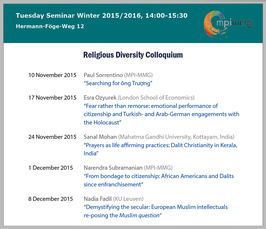"An ethnographic theory of hospitality: reflections from Tibetan borderlands"
Tuesday Seminar Winter 2015/2016
- Date: Dec 15, 2015
- Time: 02:00 PM - 03:30 PM (Local Time Germany)
- Speaker: Giovanni da Col (University of London)
- Giovanni da Col is Director of the newly founded Centre for Ethnographic Theory at SOAS, University of London, and member of the ERC-KHAM project at CNRS-Centre d’Etudes Himalayennes. He has done fieldwork on conceptions of vitality, witchcraft and modes of deception in China’s official Shangri-la, and is currently conducting research on self-immolations among Tibetans in PRC and Naxi-Tibetan rituals of life and prosperity. He is the Founder and Editor-in-Chief of HAU, Journal of Ethnographic Theory, Executive Publisher of HAU Books, the author of several peer-reviewed articles, and editor of a few collections, including three volumes on hospitality and fortune (2012 JRAI, Social Analysis-Berghahn). Some overdue collections and monographs are forthcoming in 2016: The Invisible State: Spirits and Environmental Worlds on China’s Frontiers (The Asia Pacific Journal of Anthropology-Routledge), Cosmoeconomics: Theorising vitality, prosperity and alternative economies today (Anthropological Theory); and Anthropology and Life Itself (with Bhrigupati Singh, Clara Han and Bob Desjarlais, 2016). He is currently working on an invited article on Hospitality for the Annual Review of Anthropology and the entries ‘Life’, ‘Luck, Fortune and Chance’ and ‘Event’ for Wiley-Blackwell’s International Encyclopedia of Anthropology (in preparation) His monograph on negative kinship, poisoning and hospitality in Tibetan borderlands is under consideration at the University of Chicago Press.
- Location: MPI-MMG, Hermann-Föge-Weg 12, Göttingen
- Room: Conference Room

For more details please contact vdvoffice(at)mmg.mpg.de.
This lecture, a sequel to an earlier JRAI project on hospitality and a draft of a larger work-in-progress on the same theme for the Annual Review of Anthropology, deals with a thought-experiment, an exercise in ethnographic theory (albeit an old-fashioned one). The problem investigated is as follows: why in a geographic zone approximately running from the Himalayas to Mongolia to Siberia do we find a surprising “propensity” for social practices related to hosting and hospitality; sacrifice to gain favour from a host or spirit master; and subjective concerns for accumulation, storage, hoarding, containership (the notion of house society may work on different scales in this region, from the Mongolian tent to the Buddhist monastery) and related preoccupations with leakages and parasitism. Whereas anthropological inquiry in India often emphasised personhood and hierarchy as distinctive cultural concepts-cum-heuristics, Melanesianists posed exchange, and Amazonianists warfare and enmity-- in what we shall tentatively (and arbitrarily) name the Cumulus cultural zone personhood is superseded by a subject-defining dialectic relation of masterhood, also replicated linguistically on different scales (e.g. the particle bdag in Tibetan, used for householder, spirit and land master, owner or patron; same for ezhen/eezhen in Mongolian and other Turkic languages). We shall begin from three methodological propositions: a) some regions provide the opportunity to pursue particular problems in anthropological theory whereas others do not; b) the categorical uncertainty and paradoxical nature of some concepts may lead to their transmission and reproduction; c) hospitality constitutes a transcendental field of value creation and relations of exchange, a meta-communicative framing peculiarly (and paradoxically) similar to play, joking and banter. By way of a few ethnographic examples from NW Yunnan and Tibetan Borderlands--including a previously undocumented ritual involving male cross-dressing --I will propose an ethnographic theory of hospitality and return to one of my early concerns: imagine what anthropology might look like today if Marcel Mauss had chosen hospitality rather than the gift as the subject of his Essai.